#sokoto caliphate
Text
The Sokoto Caliphate: History, Legacy, and Impact On One Of Africa's Powerful Caliphate In West Africa
OThe Sokoto Caliphate, also known as the Sultanate of Sokoto, was a powerful Sunni Muslim caliphate that emerged in West Africa in the early 19th century. Founded by the revered leader Usman dan Fodio during the Fulani jihads, this influential empire played a significant role in shaping the region’s history and continues to leave a lasting impact on contemporary Nigeria and West Africa as a…
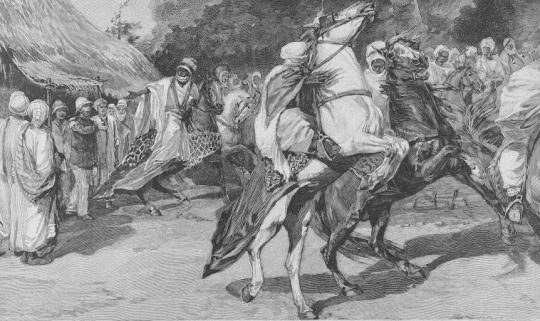
View On WordPress
#African empires#African History#African kingdom#Legacy#medieval African Kingdom#Sokoto Caliphate#Sultanate of Sokoto#Sunni Muslim caliphate
1 note
·
View note
Text
The Sokoto Caliphate has its relevance not least in determining the endless endemic violence in Nigeria taking the shape it does:
The Sokoto Caliphate itself is the root of the civil war in modern Nigeria in one sense, as it was the largest unit in what's now Northern Nigeria that left the direct impact on that cultural gap between the Muslim north and the largely non-Muslim south. Forged in the Fulani Jihad, it remained one of the most warlike states in a region whose neighbors included the other mirror warlike state, the Kingdom of Dahomey.
It was able to hold itself together for a better part of a century and its fall will be returned to when this reaches the Scramble. That very legacy of a centralized Islamic state led by the Fula and the Hausa, who had an equally typical of the Islamic world merger of ruler and ruled across ethnic lines because ethnic groups are not essentialist, and they never are, and never will be, is why I also ungenerously but accurately define the endemic wars in Nigeria as a temper tantrum by Muslims who refuse to accept that the union of regions with distinct histories was not a blueprint for massed forced conversion and the efforts of non-Muslims to resist it.
#lightdancer comments on history#black history month#west african history#military history#sokoto caliphate#nigeria#the big civil wars in nigeria are the ultimate proof that by oil alone is not the guiding force of modern politics#neither is a knee-jerk reaction to nihilistic violence by Islamic imperialists#because if it were true this decades-long petulant temper tantrum over the existence of non-muslims#would have touched off an equally continuous major European and US presence that does not exist
1 note
·
View note
Photo
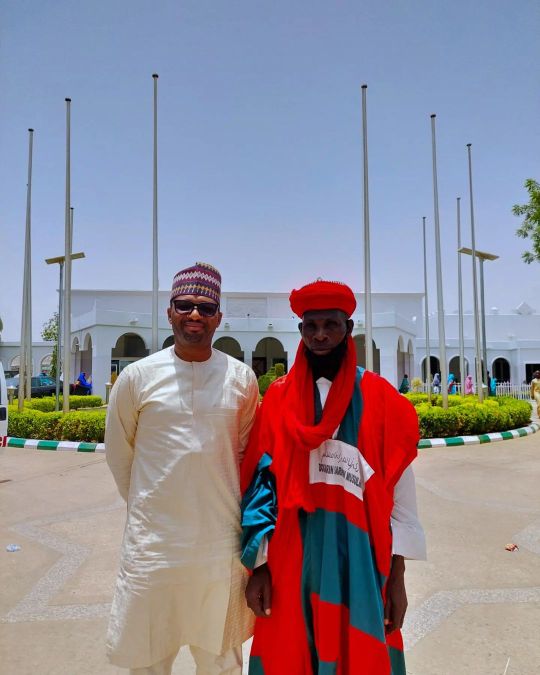
The Sokoto Caliph is the ruler of the Sokoto Caliphate. The official title is Sultan of Sokoto and includes the title "Amir-ul-Momineen". The post has become increasingly ceremonial since British rule, but the Sultan, considered a spiritual leader in the Muslim community in Nigeria, can still carry much weight with Fulani and Hausa people from northern Nigeria. Entrance to the modern Sultan's palace in Sokoto Sokoto Caliphate in the 19th century The Sokoto Caliphate leaders are partly Arabs and partly Fulani as stated by Abdullahi dan Fodio, brother of Usman dan Fodio who claimed that their family are part Fulani, and part Arabs, they claimed to descent from the Arabs through Uqba ibn Nafi who was an Arab Muslim of the Umayyad branch of the Quraysh, and hence, a member of the family of the Prophet, Uqba ibn Nafi allegedly married a Fulani woman called Bajjumangbu through which the Torodbe family of Usman dan Fodio descended.[1] Caliph Muhammed Bello writing in his book Infaq al-Mansur claimed descent from Prophet Muhammad through his paternal grandmother's lineage called Hawwa (mother of Usman dan Fodio), Alhaji Muhammadu Junaidu, Wazirin Sokoto, a scholar of Fulani history, restated the claims of Shaykh Abdullahi bin Fodio in respect of the Danfodio family been part Arabs and part Fulani, while Ahmadu Bello in his autobiography written after independence replicated Caliph's Muhammadu Bello claim of descent from the Arabs through Usman Danfodio's mother, the historical account indicates that the family of Shehu dan Fodio are partly Arabs and partly Fulani who culturally assimilated with the Hausas and can be described as Hausa-Fulani Arabs, Prior to the beginning of the 1804 Jihad the category Fulani was not important for the Torankawa (Torodbe), their literature reveals the ambivalence they had defining Torodbe-Fulani relationships. They adopted the language of the Fulbe and much ethos while maintaining a separate identity.[2] The Toronkawa clan at first recruited members from all levels of Sūdānī society, particularly the poorer people. Thanks to our sponsor @simagazine #KanteQuest #BushManMoha #Nigeria'sTourGuide #Sokoto #Caliphate #Sultan'sPalace #EID (at The Sultan Of Sokoto Palace) https://www.instagram.com/p/Cdt9yWdjD9B/?igshid=NGJjMDIxMWI=
0 notes
Text
FISHING FESTIVAL IN AFRICA
Argungu Fishing Festival
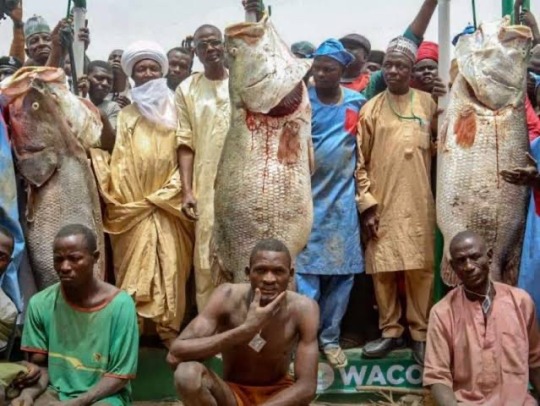
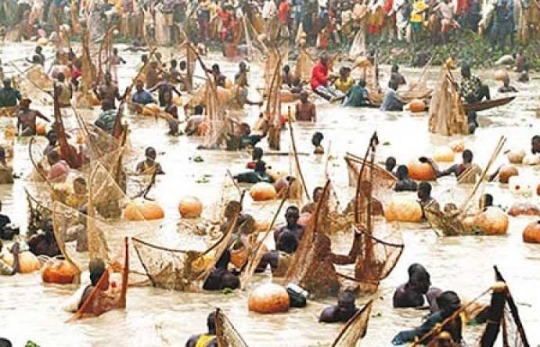
There are lovely cultures and traditions in Africa
Black Americans should read about their heritage
Welcome to Argungu Fishing Festival
Argungu fishing festival is a way of life for the people of Kebbi State. The festival preserves tradition and promotes conservation. The annual festival takes place in February and marks the end of farming season and start of the fishing season. The festival is a four-day cultural event. It begins with an agricultural show, water sport displays, traditional Kebbawa entertainments and ends with the spectacular fishing competition in the Mata Fadan River.
The History
The Argungu fishing festival began in 1934, marking the end of centuries old hostility between Sokoto Caliphate and Kebbi Kingdom. The festival quickly became a celebration of life and unity.

The River Sacrifice
Before the commencement of the fishing festival, the custodian of the river 'Sarkin Ruwa' ensures the river is safe by performing sacrifices to the river oracle to gain its permission.

Sarkin Ruwa
Like his fathers before him, the Sarkin Ruwa is the official custodian of the Mata Fada River. This responsibility is passed down for generation. Without the consent of the Sarkin Ruwa, no fish can be caught. To ensure the river is safe for fishing, he dispels the crocodiles resident in the river and invites all the fishes in the rivers connected to Mata Fada river.
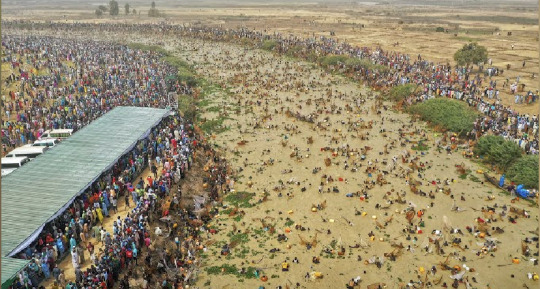
Matan Fada River
The river is a source of pride to the people of Argungu, it serves as a source of food and irrigation for their farm lands. Its about 50 meters wide and about 50 feet deep.
Race To Fish
At the sound of a gun, thousands of fishermen race towards the mata fadan river, leaping into the water to begin their search for the winning freshwater fish
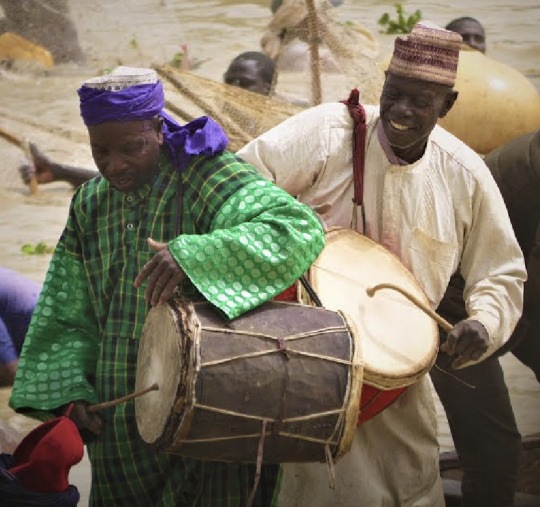
Music and Rhythm
As the fishermen leap into the water, the drummers begin to beat their drums. Filling the air with authentic Kebbawa traditional rhythm. Although women are not allowed to participate in the fishing competition, they are not left out of the drummers group. The drums are traditional Kebbawa drum designs, made of cow skin.
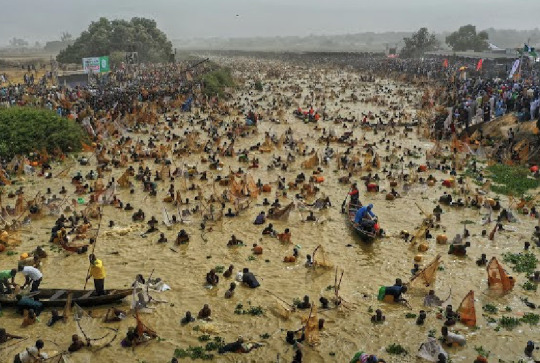
Over 50,000 fishermen from northern Nigeria and surrounding countries participate in the fishing competition annually.
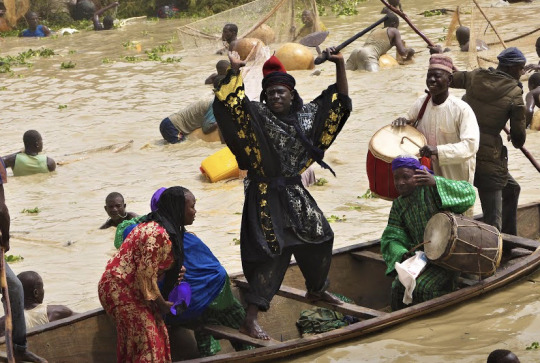
The Sarkin Ruwa and the drummers move to and fro the mata fada river on their canoes, entertaining the fishermen as they search the river for the winning Giwan Ruwa.
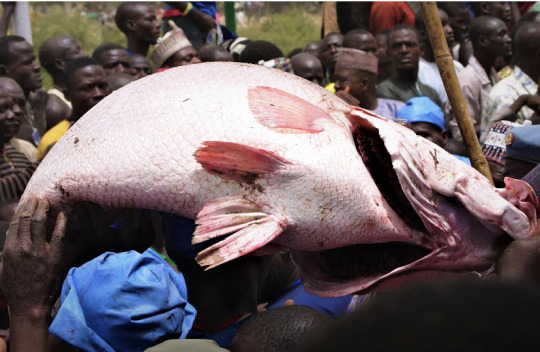
Giwan Ruwa
Giwan Ruwa 'Fish' from the mata fadan river can weigh up to 75 kilograms. The fisherman with the biggest catch wins the fishing competition.
#life#animals#culture#aesthetic#black history#history#blm blacklivesmatter#anime and manga#architecture#black community#traditional illustration#traditional doodle#blacklivesmatter#black heritage
279 notes
·
View notes
Note
may I ask what you're researching? I'm very intrigued now!
i'm researching the history of textile manufacturing and trade in kano (a city in northern nigeria, one of the original hausa kingdoms) during the sultanate of kano and fulani rule under the sokoto caliphate from the late 1700s to about the 1880s, just before the british conquered the region. kano was a centre of trade on the trans-saharan routes for centuries and 'the' centre of cloth production in west africa for a very long time, with the majority of the city devoted to extensive cotton production, spinning, dyeing, and weaving (as well as leatherworking, agriculture, and the slave trade, among others). cloth from kano was traded across africa and into europe, west asia, india, and onward.
because of my background in weaving and craft, i'm not only studying the history of the trade and production but the actual production itself; as in, i am trying to figure out exactly how they processed the cotton, dyed it, wove it, what equipment and techniques were used in this process, etc. and understand how these relate to the economic and cultural history of the region <3
if you're interested in my bibliography so far i uploaded the list for viewing here (and if you want any of the documents and don't have access to them via jstor or whatever send me a private mssg and i can send them to you)
#i actually have more readings i havent added to the list yet but im lazy rn ill update it later#a couple of the works cited are physical books so i cant send pdfs of them but most are just pdfs lol
68 notes
·
View notes
Photo
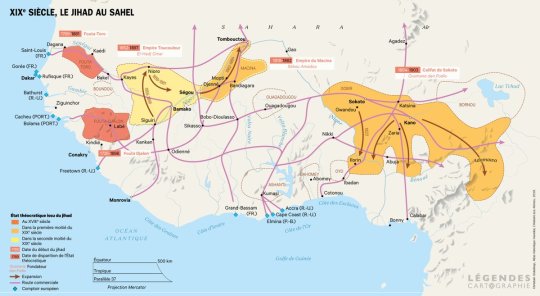
The Sahara and the Sahel were marked in the 19th century by a series of holy wars, modifying societies and state structures. Some men and groups question the powers that be. Dan Fodio founded the Caliphate of Sokoto and El-Hadj Omar the Toucouleur empire.
by @LegendesCarto
79 notes
·
View notes
Text
NANA ASMA’U // PRINCESS
“She was a Fula princess, poet, teacher, and a daughter of the founder of the Sokoto Caliphate, Usman dan Fodio. She remains a revered figure in northern Nigeria. She is held up by some as an example of education and independence of women possible under Islam, and by others as a precursor to modern feminism in Africa.”
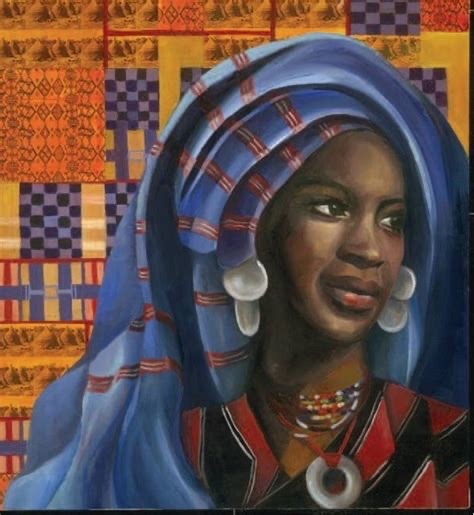
2 notes
·
View notes
Text
Submitted via Google Form:
How can I design a fantasy government especially if culture drastically differs from real life? Vocabulary, duties, how people are chosen, hierarchy, division of land and governors, and anything that may be government-run?
Tex: Base it off the fantasy culture, more or less. Government is in itself formalized communication, dispute resolution, and resource management. It is in some ways also the peak of what a culture considers efficient decision-making that is both long-lasting and appeasing to as many people as possible (feel free to throw wrenches into the idea for things like racism, etc). Figure out what your culture has decided are important enough subjects to delegate Official People to, and then figure out what they don’t want in terms of parameters (i.e. do they want to be taxed on different plants in their yard, and how extensive do they like postal routes).
It’s going to be a mish-mash, coordinated in some areas and disparate in others. Don’t worry about that bit, because it's the flaws that make it realistic, and gives narrative room for characters and different plots to develop.
Utuabzu: Government structures are shaped by a couple broad factors: culture (they reflect the biases and ideals of the dominant culture at the time of creation), history (government structures tend to be pretty conservative and old rituals, titles, conventions and terminology often hang around long after they lost any practical utility*) geography (a structure that has to govern many disconnected areas such as islands or mountain valleys is usually going to be less centralised than one that governs a single wide flat river valley) and wider context (states tend to imitate stronger, more prestigious or successful peers**).
So, working off that obscenely long sentence, my recommendations are as follows: firstly, consider the purpose being served in your story. If you need the government to be elected in some way, account for this. If this is just worldbuilding for fun or for a game setting or something, though, you can ignore that part. Next up, you need to have a rough idea of the ancestral culture of the dominant/founding group of the state. What were their basic values? What did they believe? Did they seek consensus through assemblies or did they have a divine monarchy? Then you can play around with their history. Consider how the state expanded and evolved over time, and what other states, cultures, philosophies and religions it came into contact and entered into dialogue with. If at some point the neighbouring nation was extremely powerful, it would not be unreasonable for reformists in your state to adopt some of their structures, complete with (slightly mangled) titles.
Looking for inspiration, Wikipedia is your friend. It has great long lists of titles and government forms, from unitary autocracies to confederal direct democracies and everything in between, usually with examples from which you could borrow some names. A quick skim through the histories of states like the Holy Roman Empire or the Venetian Republic or any given Chinese dynasty should give you at least some ideas. But don't be shy to look at more unfamiliar states like the Aztec Empire, the Majapahit Empire, the Mamluk Sultanate or the Sokoto Caliphate for other ideas. The 5000 years or so of human history is a wonderful resource to draw from in this regard because people have tried so many different forms of government, in so many cultural, technological, philosophical, geographic and diplomatic contexts. No matter what you come up with (barring something that relies on scifi tech or magic to function), chances are there's been at least one society that did something similar at some point.
*eg. During the election of the Speaker in Westminster-style parliaments, they are theatrically dragged to the chair because in centuries past being the one who had to tell the monarch that Parliament said no was not a particularly coveted position.
**eg. Japan adopted a British-style parliament and cabinet structure during the Meiji Restoration because at the time the UK was the undisputed superpower, and generally when setting up or reforming a government structure people look to either the past or to the most relevant hegemonic power for inspiration.
Feral: I second both Tex and Ubuabzu and would just like to add…
King, warlord, and chieftain all very different connotations despite often serving the same governmental role. However, choosing to give your sovereign that plays essentially the same role a title that is a completely made up word, like “xvat” or something, because you want to prove that it’s from a different culture is going to confuse and frustrate a general audience. Choose the titles that are closest to the context and connotations you need to convey and don’t stress too much about perfect matches; if it’s necessary to the story, you can always provide details that will help the audience grasp how this king’s position is just slightly different than the concept they have from the real world.
27 notes
·
View notes
Text
Major cities in Niger are facing rolling blackouts following last week's coup in the West African country.
The power shortages are a result of Nigeria cutting supplies to its northern neighbour, Niger's electricity company Nigelec says.
West African trade bloc Ecowas has put sanctions on Niger, but has not said if these include electricity supplies.
Ecowas defence chiefs are meeting in Nigeria to discuss a potential military intervention to roll back the coup.
On Sunday, West African leaders gave Niger's military junta a week to give up power or face possible military consequences.
Speaking on Wednesday, Abdel-Fatau Musah, Ecowas commissioner for political affairs, peace and security, said an armed intervention would be a "last resort". But he insisted that the bloc had to "prepare for the eventuality".
Ecowas has vowed to end the wave of coups that has plagued West Africa's Sahel region in recent years. With this in mind, Mr Musah said there was "a need to demonstrate that we cannot only bark, but can bite".
The ruling military juntas in Mali and Burkina Faso have warned Ecowas against any intervention in Niger, insisting any military action against the new regime would also be tantamount to a "declaration of war" against them. They did not send their defence chiefs to the Ecowas meeting in Nigeria's capital, Abuja
European countries are currently evacuating its citizens from Niger.
Residents living in the cities of Niamey, Maradi and Zinder have power for about an hour at a time before it is switched off for up to five hours.
Power cuts like these are unusual in Niger, which normally has regular and reliable supplies.
But the country is heavily dependent on its wealthier neighbour to the south, Nigeria, as its main supplier of electricity. In 2019, Nigelec's chief executive told the Ideas For Development outlet that Niger relied on Abuja for up to 70% of its electricity supply.
The Transmission Company of Nigeria has declined to comment on the power cuts in Niger.
But an anonymous source told the BBC the supply to Niger was cut on Tuesday following a presidential directive.
Niger's democratically elected President Mohamed Bazoum was overthrown in a military coup last week by his own presidential guards who stood watch outside his palace.
The constitution was suspended and Gen Abdourahmane Tchiani, chief of the presidential guard, was installed as the head of state.
The military government has now announced the reopening of Niger's borders with Algeria, Burkina Faso, Libya, Mali and Chad. Its borders with Nigeria remain closed.
A delegation from Ecowas - the Economic Community of West African States - arrived in Niger's capital, Niamey, on Wednesday as mediation continues following the coup. It is led by Nigeria's former military head of state, Gen Abdulsalami Abubakar, who oversaw that country's transition from military rule to democracy in 1999.
Nigeria's most senior Muslim leader, the Sultan of Sokoto, Muhammadu Sa'adu Abubakar III, is also reported to be part of the team. He also wields huge influence in Niger, part of which used to be in the Sokoto Caliphate, a powerful kingdom before colonial rule.
Evacuation flights have now started to arrive in Europe. Some 262 French citizens touched down in Paris early on Wednesday amid anti-French sentiment in the country.
The coup has prompted demonstrations against the former colonial power, with the French embassy coming under attack.
France says it has no plans to repatriate about 1,000 French soldiers stationed there as part of efforts to counter Islamist militants.
5 notes
·
View notes
Text
This is one of the most important scholars you have probably never heard of. 'Uthman Dan Fodio (Ibn Fudi) was not only a scholar, he was also a brave leader and a religious teacher, revolutionary, and philosopher who founded the Caliphate called Sokoto and ruled as its first Caliph. His followers pledged allegiance to him as the Commander of the Faithful (Amir al-Mu'minin).
He was a prominent and a significant scholar. He was Ash'ari in Creed, Maliki in Madhhab and Qadiri in Tariqah.
He proscribed the use of turbans for men and veils for women and is today known as the most important reforming leader of the western Sudan region in the early 19th century. According to many, he was a Mujaddid, a reviver of faith, who spread Islam in Africa. He strengthened Islam in West African countries.
It is said the the noble Shaykh only smiled three times throughout his life time. The time he saw the Holy Prophet ﷺ, the day he conquered a town and the day he retuned back to his Lord.
Al-Fatiha for his noble soul
3 notes
·
View notes
Text
Will Peter Obi Run For President In Nigeria 🇳🇬 Again‽
The answer is probably yes, as Peter Obi has been making a few exciting moves over the past few months.
Since Ramadan began in early March, Obi has visited several mosques in northern Nigeria like Nasarawa, Niger and Kebbi and is expected to visit more during the holy month. He also visited an Islamic centre in Lagos and was in Sokoto, the seat of the caliphate.
“In continuation of my…

View On WordPress
0 notes
Text
The Legacy of Nana Asmaʾu: Scholar, Poet, and Islamic Leader
Nana Asma’u, a remarkable figure in the history of Nigeria and Islam, was much more than just a princess. She was a poet, a teacher, and a prominent female scholar who left an indelible mark on her society and continues to inspire people today.
Born in 1793 into a family deeply influential in the establishment of the Sokoto Caliphate, Nana Asma’u was destined for greatness. Her father, Usman dan…
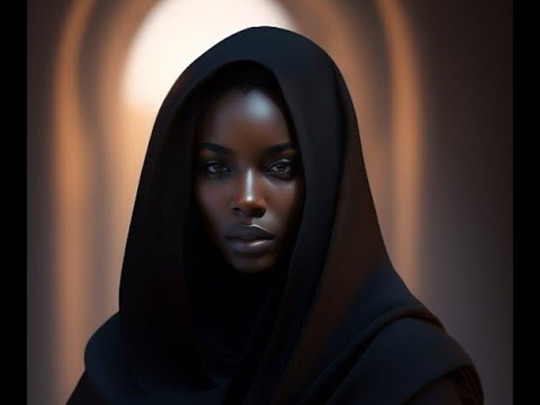
View On WordPress
#African History#Fula#Fula history#Fula poet#Fula princess#Fula teacher#Nana Asmaʾu#Nigeria history#Sokoto Caliphate#Usman dan Fodio#West African
1 note
·
View note
Text
Usman dan Fodio is a fairly typical kind of figure in Islamic history:
It should be noted further on those same lines that Usman dan Fodio is a very typical figure in Islamic history. The self-proclaimed reformer renewing the state against the loathsome semi-godless hedonists of the settled cities with all the wealth, proclaiming himself the renewer and restorer of the Ummah. He builds an army from a group of otherwise-divided tribal structures, creating states more or less ex nihilo, and proving a highly efficient warlord, if somewhat limited in any other factor of state-building. This pattern of states ex nihilo sees the newly empowered army smash and butcher and burn everything in its path, creating a new domain and a new dynasty atop the legacy of older ones.
This, in so many words, is the history of how the Sokoto Caliphate was formed, and its mirrors are legion, including ISIS in modern times, Tamerlane in Central Asia, Shah Ismail I and his equivalents in the Ottoman Empire's earliest days, Malik-Shah and Alp Arslan of the Seljuk Sulanate, and so on.
#lightdancer comments on history#black history month#african history#military history#islamic history#usman dan fodio#sokoto caliphate
0 notes
Text
Opinion: Ganduje’s Emirates Should Be Abolished
By; IBRAHIM ADO-KURAWA
When the British conquered Nigeria, they appropriated the Emirate institution and used it to rule the people. Most of the Emirate dynasties of the Sokoto Caliphate across northern Nigeria were about a century old at the time of the British conquest. Their legitimacy was based on the Jihad led by Shehu Usman Danfodio and his followers from 1804 to 1807.
In Kano, the…
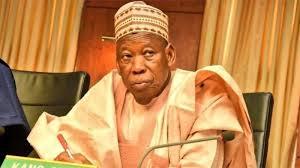
View On WordPress
0 notes
Text
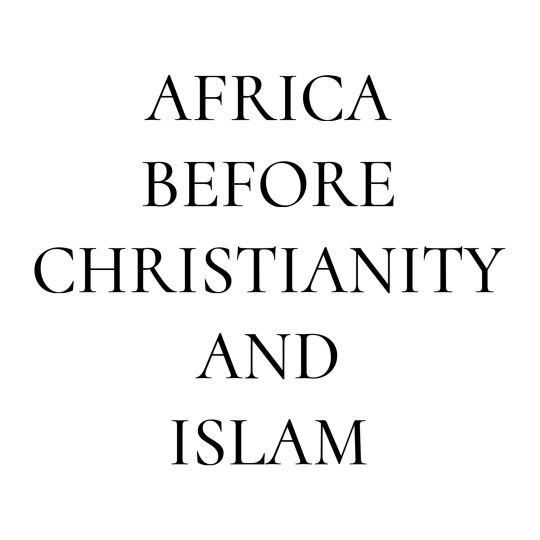
Africa has been very rich even before colonialism
The truth you should know about African
Blacks know your history and divinity
They gave us the Bible and stole our natural resources
Community and Social Cohesion: Traditional African religions often emphasized communal values, fostering a sense of belonging and mutual support within the community. Rituals and ceremonies were communal events that strengthened social ties.
Respect for Nature: Many African traditional religions were deeply connected to nature, promoting a harmonious relationship with the environment. This connection often led to sustainable practices and a respect for the natural world.
Ethical Guidelines: These religions often included moral and ethical guidelines that governed interpersonal relationships. Concepts such as honesty, hospitality, and respect for elders were commonly emphasized.
Cultural Identity: Traditional African religions played a crucial role in shaping cultural identity. They provided a framework for understanding the world, explaining origins, and passing down cultural practices through rituals, myths, and oral traditions.
Islam reached Nigeria through a combination of trade, migration, and cultural interactions. The trans-Saharan trade routes were crucial in bringing Islam to the region. Muslim traders from North Africa and the Middle East ventured into West Africa, establishing economic ties and introducing Islam to local communities.
The city-states along the trade routes, such as Kano and Katsina, became significant centers for Islamic influence. Merchants not only engaged in commercial activities but also played a role in spreading Islamic teachings. Over time, rulers and elites in these city-states embraced Islam, contributing to its gradual acceptance.
Additionally, the spread of Islam in Nigeria was facilitated by the activities of Islamic scholars and missionaries. Scholars known as clerics or Mallams played a key role in teaching Islamic principles and converting people to Islam. They often established Quranic schools and engaged in educational activities that promoted the understanding of Islamic teachings.
Military conquests also played a part in the expansion of Islam in Nigeria. Islamic empires, such as the Sokoto Caliphate in the 19th century, emerged through conquest and warfare, bringing Islam to new territories. The Sokoto Caliphate, led by Usman dan Fodio, sought to establish a strict Islamic state based on Sharia law.
Overall, the spread of Islam in Nigeria was a gradual process influenced by trade networks, migration, the activities of scholars, and, at times, military expansion. The interplay of these factors contributed to the integration of Islam into Nigerian society, shaping its cultural and religious landscape.
In the vast tapestry of Africa's rich cultural heritage, herbal traditional healing stands out as a profound and time-honored practice. African herbal traditional healers, often known as traditional or indigenous healers, play a vital role in the healthcare systems of many communities across the continent. Their practices are deeply rooted in the natural world, drawing on centuries-old wisdom and an intimate understanding of local flora.
African herbal traditional healers are custodians of ancient knowledge, passing down their expertise through generations. They serve as primary healthcare providers in many communities, addressing a wide range of physical, mental, and spiritual ailments. The healing process involves a holistic approach, considering the interconnectedness of the individual with their community and environment.
One of the hallmark features of African herbal traditional healers is their profound knowledge of medicinal plants. These healers have an intricate understanding of the properties, uses, and combinations of various herbs. Passed down through oral traditions, this knowledge is often a well-guarded family secret or shared within the apprentice-master relationship.
The methods employed by herbal traditional healers encompass diverse approaches. Herbal remedies, administered as infusions, decoctions, or ointments, form a significant part of their treatment. These remedies are carefully crafted based on the healer's understanding of the patient's symptoms, lifestyle, and spiritual condition. Additionally, rituals, ceremonies, and prayers are often incorporated into the healing process, acknowledging the interconnectedness of physical and spiritual well-being.
African herbal traditional healers frequently integrate spiritual elements into their practice. They believe that illness can be a manifestation of spiritual imbalances or disharmony. Through rituals and consultations with ancestors or spirits, healers seek to restore balance and harmony within the individual and the community.
Herbal traditional healers are integral to the social fabric of their communities. They often serve not only as healers but also as counselors, mediators, and keepers of cultural traditions. Their practices are deeply intertwined with community life, contributing to the resilience and cohesion of African societies.
While herbal traditional healing holds immense value, it faces challenges in the modern era. The encroachment of Western medicine, issues related to regulation and standardization, and the potential exploitation of traditional knowledge pose threats to this practice. However, there is also a growing recognition of the importance of integrating traditional healing into mainstream healthcare systems, leading to collaborative efforts to preserve and promote this valuable heritage.
African herbal traditional healers are bearers of an ancient legacy, embodying a profound connection between humanity and the natural world. Their healing practices, rooted in herbal wisdom and spiritual insights, offer a unique perspective on healthcare that complements modern medical approaches. Preserving and respecting the knowledge of these healers is not only crucial for the well-being of local communities but also for the broader appreciation of the diverse cultural tapestry that defines Africa.
#life#animals#culture#aesthetic#black history#history#blm blacklivesmatter#anime and manga#architecture#black community
123 notes
·
View notes
Text
This is Lukman Gbadegesin Chosen by Oyomesi, A British-fulani Colony in the heartland of Yoruba.
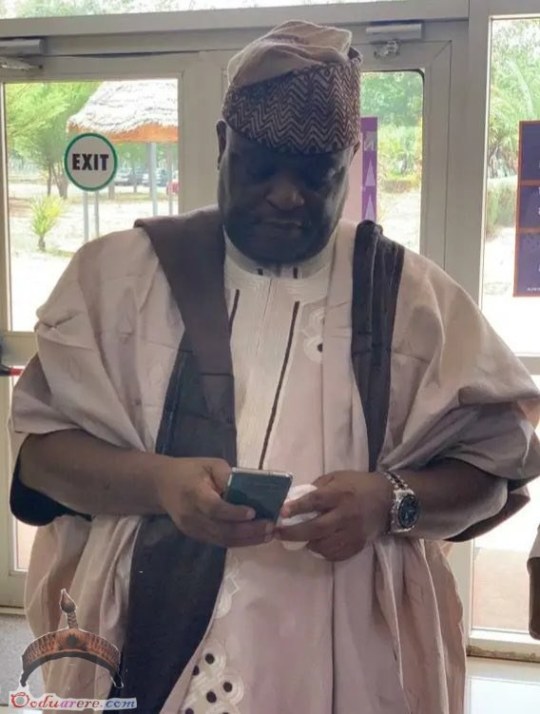
The prince was chosen by Oyomesi. Governor Makinde rejected him. He said the process was flawed and manipulated to favor him. He insisted on a new process free and fair. Before we talk about him, let’s talk about his grandfather His grandfather was King Belo Gbadegesin.
He worked with the British to build a Fulani Yoruba alliance which the homegrown Yoruba nationalists at the time led by Awolowo rejected. Belo detested anything Yoruba tradition. He refused to live in the old palace and built a new one with a mosque in the compound.

He stayed away from cultural activities and redefined the position of the Alaafin as a custodian of tradition. King Belo disliked the sage for rejecting friendship with the North. When Akintola eventually worked with them to get the sage out of the way, he honored him by conferring to him the title of Aare Ona Kakanfo.
Among his wives and offspring. Let’s save that for another day to avoid gaslighting. Fast forward. His son Lukman Gbadegesin. A chip off the old block. Totally dissociated from anything traditional at Oyo. He grew up in Sokoto. Under the guidance of Arab/Fulani scholars. Politically, Lukman Gbadegesin identifies with Northern interests. He used these connections to lobby for the throne. The Bashorun along with a few clerics working with the North worked day and night to make sure he got the throne.
Details of this are too sensitive to discuss on tabloids but for Makinde, he would be Alaafin today and the great throne of Oyo would be an extension of Sokoto Caliphate. Oyo is the symbol of Fulani resistance. Ancient kings suffered many humiliations to preserve the throne. When Alaafin Amodo rejected Sokoto, his kingdom was invaded and the Alapini shrine was looted.
All the Egungun dresses were carried away along with all the young single women at Oyo. Alaafin Oluewu was taken to Ilorin as a prisoner after he was captured at the Eleduwe war of 1835, tried and openly executed for refusing to surrender Oyo to Ilorin and Gwandu. Atiba moved the capital to preserve the kingdom, rather than watch it fall into the hands of Emir Shita of Ilorin.
What they could not do through war. They are trying to do this through peace. Yoruba autonomy should never be compromised or surrendered to alien influence, not even in the name of religion.
Read the full article
0 notes